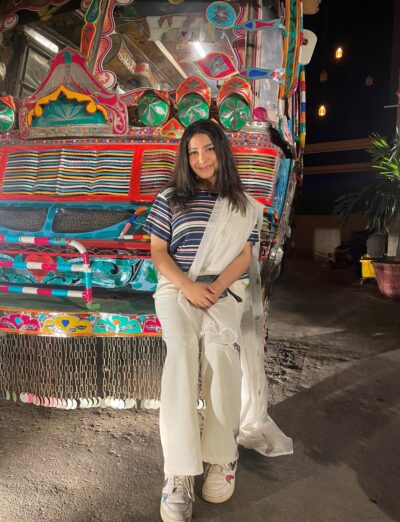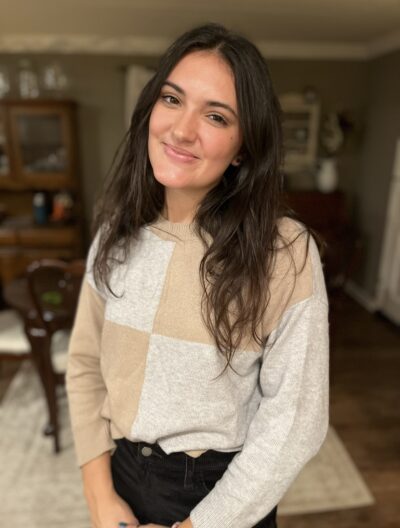August graduates reflect on unexpected journeys in Purdue’s College of Health and Human Sciences
Written By: Rebecca Hoffa, rhoffa@purdue.edu

Three times a year, a new wave of Purdue University graduates celebrate their accomplishments as they receive their hard-earned degrees. College of Health and Human Sciences students Sameeta Chunara and Madelynn Parrott are no exception.
As they finish their final experiences as Purdue students and prepare to walk across the stage during the Aug. 5 commencement, each took a moment to reflect on their unique paths in the college.
Public health undergraduate makes giant leaps in global health education

Sameeta Chunara(Photo provided)
Chunara, an undergraduate student in the Department of Public Health, has always had a love of volunteering, which is demonstrated by her time as a Girl Scout in high school, where she led a project to renovate the volunteer room in her community’s emergency shelter. This desire to make local, national and global improvements led her to the public health major.
Graduating after just two years with a bachelor’s degree in public health and a certificate in entrepreneurship and innovation, Chunara has been chosen to speak as the student responder during the Division II commencement ceremony.
“I was extremely excited about the opportunity,” Chunara said. “A big part of even applying was that I felt like I had a meaningful message to share.”
Chunara plans to talk about the importance of education and how she has seen that take shape during her 400-hour public health internship, which she completed this summer in Pakistan.
Chunara worked in early childhood development education at Aga Khan University in Karachi, Pakistan — a health sciences university with a connected hospital. In particular, she provided inpatient information to new parents after they deliver their child, focusing on information such as the importance of breastfeeding properly or the benefits of tummy time. This basic education is limited in Pakistan, so Chunara’s work aims to improve health outcomes for families. She is also writing an educational children’s book, which she hopes to publish after her internship.
“It’s really nice because every time I’ve done (the inpatient information in Pakistan), I’ve had such a good experience where the father and mother are participating and asking questions, and they’re just so grateful for the information because it’s not as readily available in their country,” Chunara said.
As Chunara prepares to enter a graduate program in health administration at Tulane University, she looks back on her experience in the Department of Public Health as being foundational in fueling her career.
“Public Health is a great place to be,” Chunara said. “The people in it are extremely passionate; they will go very far in life; and they are here to make a difference, and I feel like those are the best people to be surrounded with and to be working with.”
Speech-language pathology student finds passion through unexpected circumstances

Madelynn Parrott(Photo provided)
Parrott, a speech-language pathology graduate student in the Department of Speech, Language, and Hearing Sciences (SLHS), first considered the career path in high school when a speech pathologist came to her house to help her younger sister. After exploring different career routes, the flexibility and opportunities in speech-language pathology led her to Purdue.
“Purdue has the No. 3 (graduate) program for speech-language pathology,” Parrott said. “It’s very intimidating if you don’t know the program, but then you get to know (the SLHS faculty), and they’re so supportive and understanding.”
One Saturday early in her first semester at Purdue, Parrott was met with a stabbing pain in her back while doing laundry. An avid runner, she initially thought it was something that would pass, but as days went by and the pain remained, she went to the hospital. She discovered she had a primary spontaneous pneumothorax — a rare condition for someone in Parrott’s demographic. Essentially, her left lung had collapsed for no understood reason. After three days in the hospital and some time away from her coursework and clinic rotations, Parrott began to think she was on the mend, with the chances of recurrence remaining low.
However, on Jan. 23, with her last stretch of graduate school in sight, her lung collapsed again but this time with a 14-day stay in the ICU and more complicated means of working to treat the complication.
Through it all, Parrott noted the support of SLHS faculty helped her meet her requirements despite her condition and kept her motivated to finish strong.
“I didn’t know if I was going to be able to finish the program at that point because I was out 14 days,” Parrott said. “I had missed so much clinic work at that point. I didn’t participate in clinic — I totaled it up — seven weeks. But I wanted to do it right. I wanted to finish the program how everybody else was finishing the program.”
Ultimately, Parrott’s family and her friends Brielle Dazey and Laurie Sites, who were in the speech-language pathology program with her, are what made all the difference leading up to earning her master’s degree.
“Brielle and Laurie were the whole reason why I finished the program,” Parrott said. “The department can create paths for you and help you along the path, but Brielle and Laurie went along with me. If I wouldn’t have had them, I really wouldn’t have finished. They came every single day to the hospital. They helped me with notes. They watched the IU vs. Purdue game in the hospital with me and brought pizza. They’re the reason why I’ll graduate in (August).”
While Parrott continues to experience breathing complications and pain, she tries to look on the positive side of things, from the support she received to the time with friends and family to finding her career passion. She one day plans to work as a traveling speech-language pathologist in hospital settings.
“There are all these positives that came from it,” Parrott said. “I learned so much about the health care field. It made me want to work in a hospital as a speech pathologist. I don’t know if I would have picked a hospital, but after being in the hospital and being the patient, it gives you this whole new perspective of what it’s actually like to give patient-centered care. It’s cool how everybody’s lives are shaped different ways because of their experiences, and I just feel lucky that I have this different perspective.”